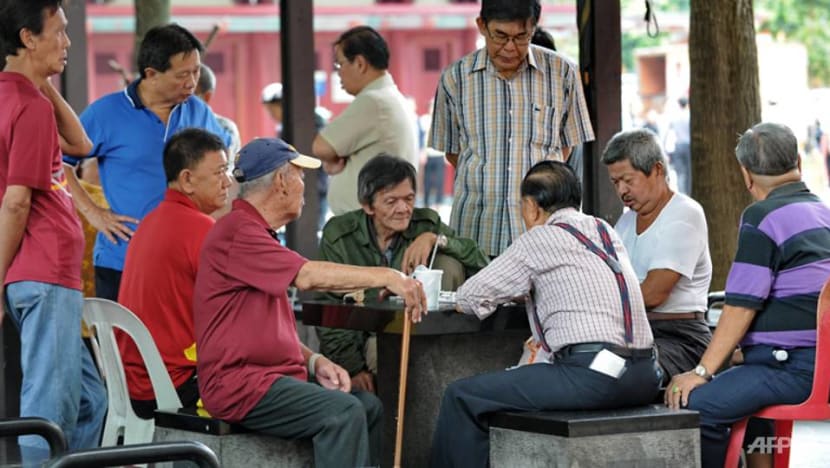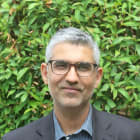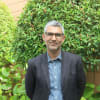Commentary: Here are 3 new 'Cs' for an ageing Singapore
With fewer babies and more older adults expected in the coming years, there is a need now more than ever to focus on successful ageing, say Duke-NUS Medical School’s Rahul Malhotra and Abhijit Visaria.

Middle-aged and elderly men playing checkers in their housing area in Singapore. (Photo: AFP/Roslan Rahman)
SINGAPORE: By most accounts, the “five Cs” - cash, car, credit card, condominium and country club - have been the hallmarks of the “Singapore Dream”. But three new “Cs” will be critical in helping Singapore navigate a sobering reality.
Singapore’s rapidly ageing population will see one in four of age 65 and above by 2030 - that’s barely seven years away. With the total fertility rate dropping to an all-time low of 1.05 in 2022, it does not bode well for our old age support ratio.
So even as the recent Budget 2023 laid out additional support for parents to raise young Singaporeans, it is also critical to improve the lives of seniors. The 2023 Action Plan for Successful Ageing, released in January, offers three new “Cs” - care, contribution and connectedness - to help seniors of today and tomorrow age well.
Though old age is generally considered as 60 or 65 years and above, “seniors” should not be thought of as a single homogeneous group. The needs, preferences and aspirations of seniors in Singapore are and will remain diverse, for instance as younger cohorts enter old age. Thus, ageing-related policies need to cater to this diversity.
AGED CARE IS NOT JUST MEDICAL
A focus on care in an action plan for older persons is not surprising. Surveys show we worry about whether we can take care of ourselves in old age or if our aged care needs will pose a burden on our loved ones.
An ageing population requires multiple facets of care. Beyond just treating an illness, there must also be preventive care to prevent or delay the onset of illness, long-term care to provide assistance with daily activities, palliative care to relieve symptoms of advanced illness, and social care which, among other functions, addresses social determinants and consequences of illness.
Coupled with the Healthier SG strategy announced last year, the 2023 Action Plan reinforces a paradigm shift in the delivery of care for older persons - from treatment to prevention, from just managing diseases to also promoting holistic well-being.
In the long-term, this shifts our mental image of aged care - it’s not only about lying in a hospital or nursing home bed, but also about participating in activities in community-based facilities, such as Active Ageing Centres or elder gyms.
Caring for seniors will fall short if we don’t also provide support for their caregivers, especially in societies like Singapore where there is often expectation for the family to care for its older members.
Research conducted by the Centre for Ageing Research and Education (CARE) at the Duke-NUS Medical School, found that older persons in Singapore who require assistance with daily activities receive an average of 40 hours of care per week from their family members.
Furthermore, the health of caregivers and of their care recipients is interlinked. Our research found that the mental health of caregivers can affect and is also influenced by the mental health of their care recipients.
The 2023 Action Plan highlights initiatives for supporting family caregivers, such as enhancement of the Home Caregiving Grant and expansion of support for caregivers of persons living with dementia.
OPPORTUNITIES TO CONTINUE CONTRIBUTING TO SOCIETY
But the narrative around an ageing population shouldn’t be gloomy. Research in Singapore also tells us we should throw away the common cliché about old age that seniors will have less productive engagement with the family, community and society at large.
CARE’s nationally representative THE SIGNS Study found that a majority (63 per cent) of older persons had moderate to high engagement in one or more productive activities, such as employment, learning, volunteering and providing support to their family.
These engaged seniors had lower depressive symptoms and feelings of loneliness, and higher cognitive function compared to those with low engagement. Research from other countries also supports the value of productive engagement of older adults.
Initiatives in the 2023 Action Plan, such as making senior volunteering more sustainable, teaching them useful life skills, like financial and digital literacy, or offering other subsidised learning opportunities, will provide a variety of avenues for continued productive engagement in their later years.

What about seniors who want to stay gainfully employed? Moves like extending the Senior Employment Credit to provide wage offsets for employers who hire older Singaporeans or the Part-time Re-employment Grant to incentivise flexible work arrangements will help but these remain incentives - employers still have a key role to play in facilitating employment.
It will be important to track if these initiatives result in increased participation by older adults in employment, lifelong learning and volunteering. Studies such as follow-up waves of THE SIGNS Study in 2023 and 2025 will enable this.
SPOTLIGHT ON CONNECTIONS AFTER PANDEMIC ISOLATION
Globally, the importance of connectedness for both physical and mental health has received significant attention during the COVID-19 pandemic, particularly due to an increase in individuals experiencing social isolation and loneliness amid lockdowns and social distancing measures.
Our research found that lonely older adults live a shorter life and have fewer potential years of good health compared to their peers who do not perceive themselves as lonely. Those who engaged with only a small social network (such as mostly with household members) over a two-year period were at a higher risk of dying in the next four years versus those who maintained a diverse social network (such as those outside the household and the larger community).
So it makes sense for the Action Plan to pursue diverse ways of promoting intergenerational bonding and enhancing the built environment and access to digital technology that can help seniors connect with people within as well as outside their family.
But the success of any ageing initiatives will require participation of older persons and their loved ones: By engaging in self-care and adhering to prescribed medications and treatments, pursuing opportunities for productive activities, and staying connected.
The 2023 Action Plan for Successful Ageing builds upon the gains of the first action plan launched in 2015, with a vision of Singapore as a city for all ages. The three new Cs renews our commitment to successful ageing.
Rahul Malhotra is Deputy Director and Abhijit Visaria is Senior Research Fellow, at the Centre for Ageing Research and Education, Duke-NUS Medical School.




















